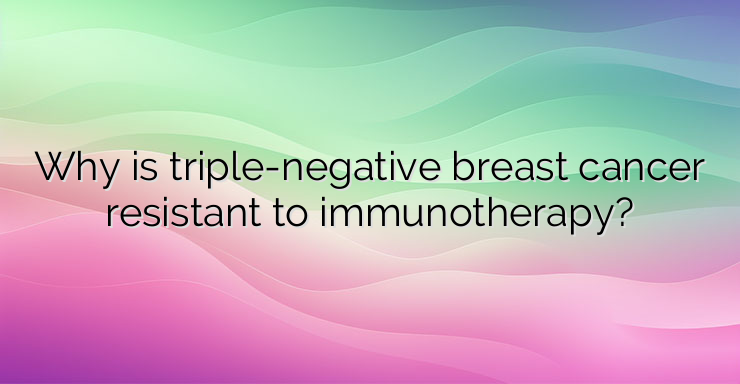Immunotherapy is one of the great advances in the fight against cancer in recent years. It is a treatment that stimulates the immune system and has great potential for eliminating tumors and treating cancer. Unfortunately, this therapy is only approved for triple-negative breast cancer, which is also the most aggressive, but with results that are still far from what is expected from immunotherapy. Increasing the effectiveness of immunotherapy in breast cancer would give a very positive prognosis for those affected and would become a very good option for more advanced cases with metastases. Metastatic breast cancer, despite important and continuous progress, still has no cure for the majority of patients. Researchers at the Hospital del Mar Medical Research Institute have discovered a way to radically increase the success of immunotherapy in triple-negative breast cancer. Why is immunotherapy not always successful? Triple-negative breast cancer accounts for only 15% of cases, but it mostly affects young women and is one of the fastest-growing cancers. It is treated with immunotherapy, but the results are not very good, which is why breast cancer has the worst prognosis and no effective treatment. A team of researchers from the Cancer Program of the Hospital del Mar Medical Research Institute, led by doctors Toni Celia Terrasa and Juan Albanel, has discovered that tumor stem cells are the main cause of resistance to immunotherapy in this subtype of breast cancer. The reason is that these cells are invisible to the immune system and this makes immunotherapy ineffective. Remember that these treatments essentially work by activating the immune system itself to attack the cancer cells. Cancer cells become invisible to the immune system In triple-negative breast cancer, the most aggressive cancer cells can represent between 5 and 50% of the entire tumor. The reason they are not detected by the immune system is because they have low levels of a factor called LCOR. This factor is key for cells to present antigens on their surface – molecules that allow the immune system to differentiate normal cells from tumor cells and attack the latter. Therefore, if this factor is low in tumor cells, immune cells do not detect them. This explains why immunotherapy has relatively low success rates. Despite treatment with immunotherapy, these cells survive and have the ability to generate resistance, which is related to their ability to hide from the immune system, allowing them to become resistant to immunotherapy, explains Dr. Tony Celia Terras. Improving immunotherapy Researchers have discovered a way to make cancer stem cells visible to the immune system so the tumor can be eliminated. The researchers confirmed the results in laboratory models and found that cancer cells ceased to be invisible to the immune system when the LCOR gene was activated.This is a kind of reconfiguration of the tumor to make it fully visible and therefore sensitive to immunotherapy, says Ivan Pérez-Núñez, the first author of the study. To accomplish this tumor reconfiguration, the scientists were inspired by the technology used in the design of RNA vaccines against COVID-19. The strategy involved introducing RNA from the LCOR gene into tumor cells and activating its function. The goal was to make the immune system better able to detect the tumor cell. Unlike healthy cells, malignant cells have much higher levels of foreign marker molecules on their surface. In this way, the body’s natural cell defenses will recognize, attack and eliminate malignant cells, explains Dr. Celia Terrasa. This technique can be applied to other types of breast cancer and other tumors, although clinical studies must be conducted first. Most importantly, the study results show an unprecedented sensitization of triple-negative breast cancer to immunotherapy, turning resistant tumors into virtually curable tumors, says Dr. Albanell. References: https://www.sabervivirtv.com/oncologia/mejora-eficacia-inmunoterapia-cancer-mama_6974


Leave a Reply